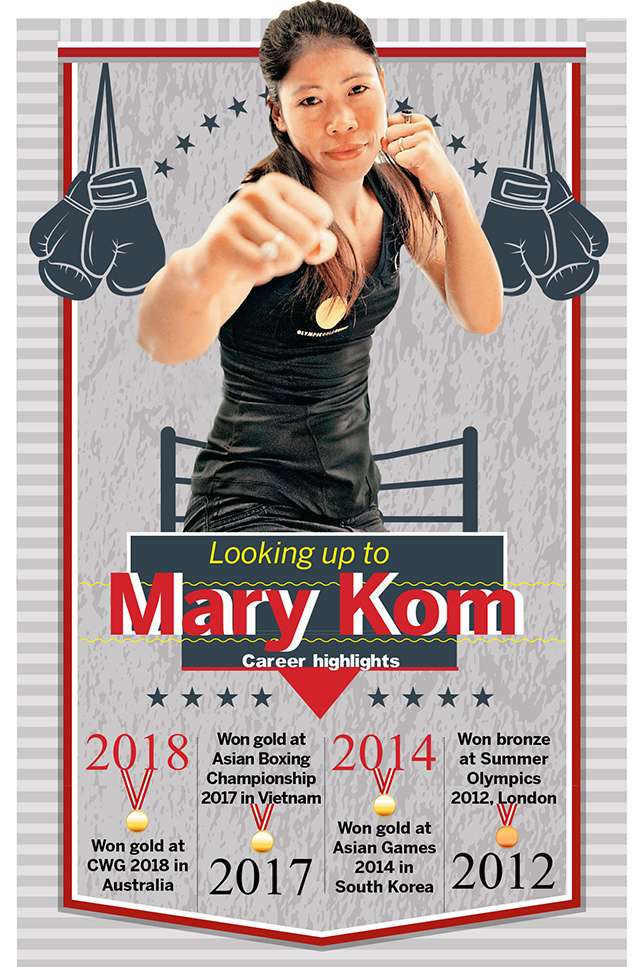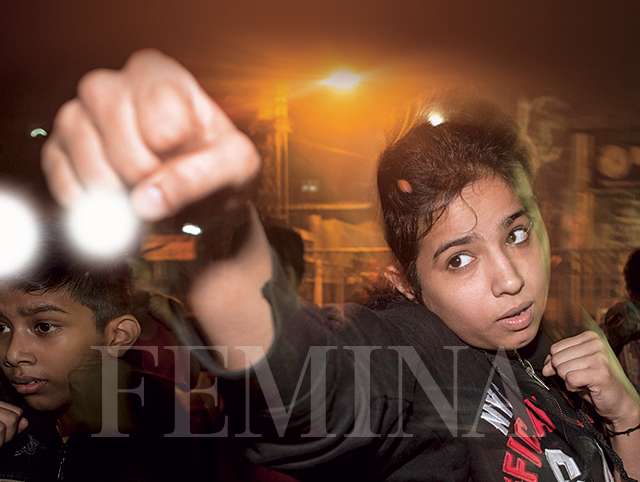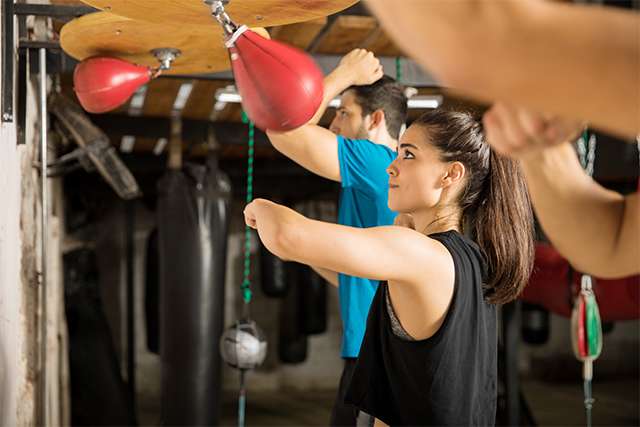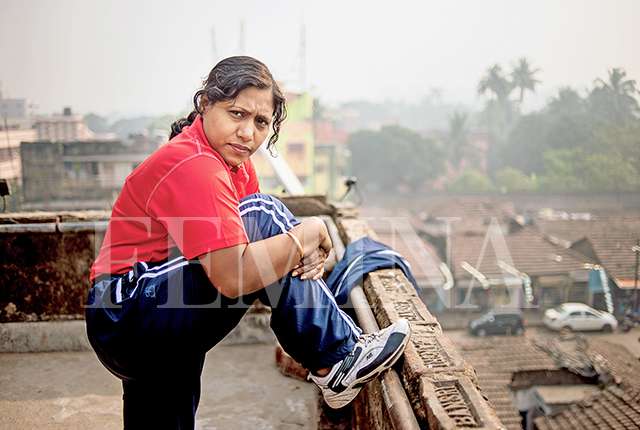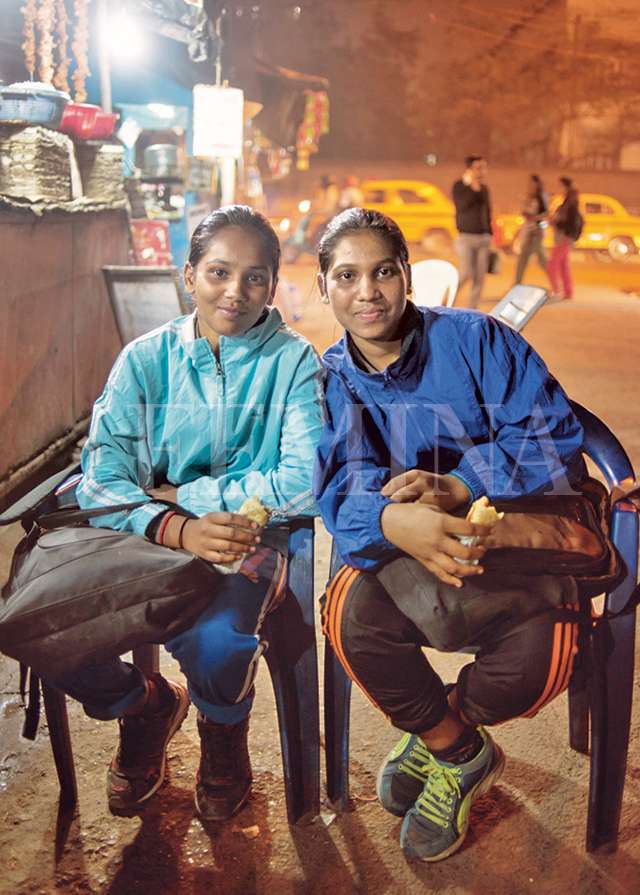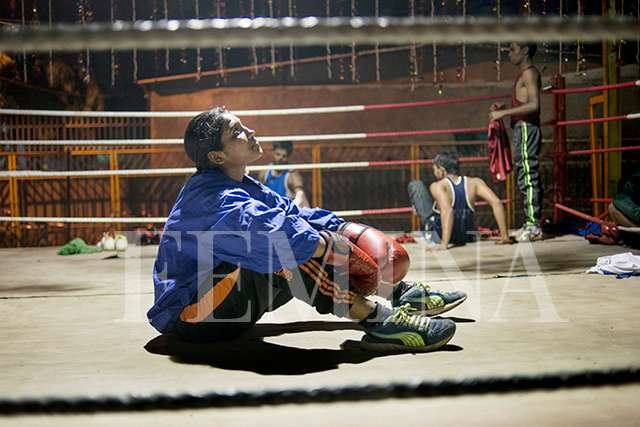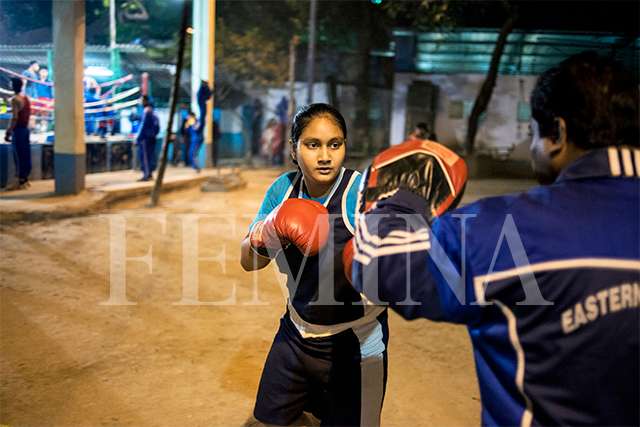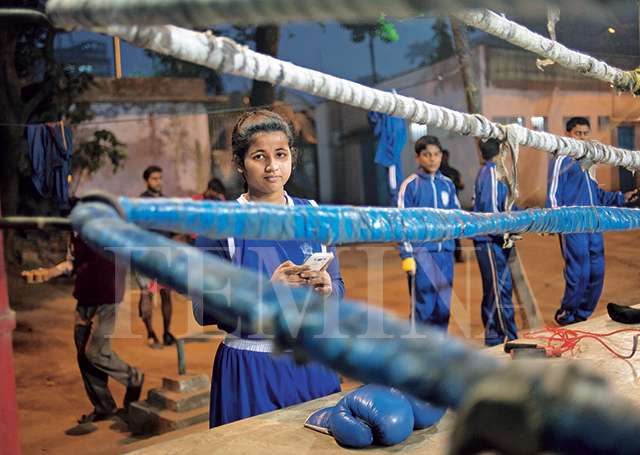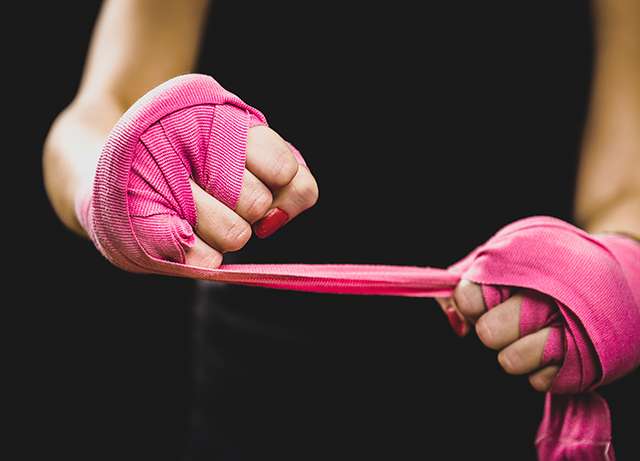Kolkata, WEST BENGAL :
It’s a chilly winter evening. A group of young women, mostly teenagers, is getting ready to enter a makeshift boxing ring at the Kidderpore School of Physical Culture, located in a non-descript courtyard in Kolkata’s Ekbalpore. Before putting on their boxing gloves, they opted for a rigorous warm-up session. There are around 17 young Muslim women boxers enrolled at the Kidderpore school. They all train under their coach, Cheena Bhai (aka Mehrajuddin Ahmed). Cheena Bhai’s students mainly come from underprivileged backgrounds, fighting stereotypes and social conventions. Ask them, who their role model is and they would sing in unison, Mary Kom. They say Mary is truly a living legend. This year, Mary had once again silenced her critics by winning a gold in women’s 45-48 kg category at the Commonwealth Games in Gold Coast, Australia. Last November, when Mary Kom claimed her fifth Asian Championships gold in Vietnam, it was hailed as one of the greatest comebacks in Indian sports. The Padma Shri and Padma Bhushan awardee was also nominated to the Rajya Sabha. The celebrated pugilist, who had to bear the brunt of racism during her journey to the top, has time and again proved that she is made of no mean mettle. A native of Manipur, Mary rose from extreme poverty to become a five-time world amateur boxing champion. Motherhood too did not deter her from scaling heights of success in a demanding sport.
The eldest of four siblings, Mary, was born to farm labourer parents. She started working at the fields from a young age to fend for her big family. In 1998, when Manipuri boxer Dingko Singh won a Gold at the Asian Games, an inspired Mary decided to take up boxing and travelled to Imphal to request coach, M. Narjit Singh at Manipur State Boxing to train her. In 2000, she won the Best Boxer Award at the First State Level Invitation at the women’s boxing championship in Manipur and there was no looking back. She went on to win National Championships five times from 2000 to 2005. Mary won the AIBA (International Boxing Association) world boxing championship thrice in 2002, 2005 and 2006, and came second in 2001.
Like her peers, Simi Parveen, 19, worships Mary Kom as well. Slim and attractive, Simi feels more at home in track pants, shorts and boxing gloves. The soft-spoken arts student, who is the youngest of eight siblings living with their parents in Kolkata’s Ekbalpore area, is an up-and-coming boxer who loves the power and the punches the game offers. She is loath to call herself a ‘burqa boxer’ because she says there are no constraints on her boxing career even as she belongs to a fairly conservative family. Her parents support her in every possible way. She represented West Bengal and won a bronze medal at a women’s boxing national held in Patna in 2012. But her career hit a hurdle, thanks to the suspension of the Indian Boxing Federation by AIBA (International Boxing Association) in 2012 and subsequent internecine squabbles in the country’s boxing bodies. No boxing national was being held in the next few years following suspension. Simi is practising hard so that she can play more and more nationals in future. Needless to say, she hopes to become as big as her favourite boxer, Mary Kom, some day and make her family as well as her country proud of her.
“Women are ideal for the game of boxing – they have the patience and killer instinct,” says Asit Banerjee, director of Competition Boxing 35th National Games, Indian Olympic Association. He says that the Sports Authority of India is very keen on maintaining domestic boxing competitions and related activities. Banerjee says that women boxing started in India way back in 2000. As per an unofficial estimate, there are about 150 women boxers, hailing from all communities, in Bengal. Statistics regarding Muslim women boxers are hard to come by. “In the late 90s, there were a couple of Muslim women boxers in my club, but now more and more girls are coming forward,” says Mehrajuddin, adding that they have to overcome a lot of hurdles from their relatives and parents to learn the game
Razia Shabnam, 37
It’s a dingy lane that leads to boxer Razia Shabnam’s house in Kolkata’s Ekbalpore. Shiny, green festoons welcome you into the narrow path. If you ask bystanders about the exact location of Shabnam’s house, they will, in all probability, draw a blank. But ask them about referee/boxer Shabnam’s coordinates and they will immediately point to a rundown grey-black threestoreyed building right at the T-junction of the malodorous lane. Shabnam lives with her husband, a fitness expert who sells mobile phones, and her two sons, aged eight and two.
Shabnam, who started learning boxing in 1997 when she was just a first-year arts student at a Calcutta University college, is now a coach, handling local and national teams, and a referee, supervising matches at the state and national level. She has even refereed matches that have featured Mary Kom. She has great admiration for Mary, whom she has seen grow as a boxer from her early days. But Shabnam was clear about her mission in life — she wanted to be a coach who could train men and women to fetch gold medals for India in international meets. Shabnam was the first Muslim woman from her neighbourhood to become a graduate and then a boxer. “There was hardly any woman boxer, from any community for that matter, from Bengal in those days,” recalls 37-year-old Shabnam, who learnt boxing in local clubs in Ekbalpore and Rashbehari Avenue. “I was good in sports and used to watch my brother learn boxing. I was encouraged to join the sport by Asit da (Banerjee).” Although her father supported her decision, her mother had reservations about boxing becoming a hindrance to marriage. After three years of rigorous training, when she finally became a certified coach, she had to put up with “jealous” male boxing coaches. “I had just three years of experience and how could I become a coach when most of my male colleagues were mere players?” says Shabnam. “So they heckled me in every possible way.” But she was unfazed.
In 2003, she coached a team from Bengal that participated in the National Games held in Hyderabad. “I was just 48 kg. Most of my team members were men and older than me. But I had no problem making them listen to me,” laughs Shabnam. She stresses that more than her community, it’s the gender discrimination prevalent in society and sports that is an obstacle to Muslim women boxers. But the situation is changing. “Women in north India get more financial support from their states — our state lacks infrastructure for women boxers.” But the situation is changing as more and more women boxers are joining the sports. “Women in North India have a bigger advantage as they get more financial support from their states – our state lacks infrastructure for women boxers,” says Shabnam, adding that many of her peers have quit boxing because of paucity of funding and social pressure. Shabnam is bent on continuing her mission. She trains young people through NGOs as well. “I do my best to convince parents to let their daughters join boxing as it’s the safest sport for women,” says Shabnam.
Ajmera, 19, and Kashmera Khatun, 16
You can call boxers Ajmera, 19, and her younger sister, Kashmera, 16, Venus and Serena Williams of their neighbourhood in Canning – their sporting prowess is well known in the area. They want to participate in the Olympics some day. Of course, it has never been easy for them. They have to overcome insurmountable odds to make their boxing dreams come true. Both sisters commute for about two hours every day to reach their training club in Kidderpore. “We walk from our home to the nearest railway station and then it takes one-and-a-half hours to reach Kolkata. It’s quite an ordeal for us,” says Ajmera, who has won five golds at state and national levels so far. But this is nothing compared to the odds they have to fight at home. “Our aunt is strictly against us taking up boxing as a career. She and our other relatives object to our wearing shorts in the boxing arena saying that Muslim girls shouldn’t do this,” says Kashmera. Things came to such a pass that Ajmera had to report mental torture by her aunt to police. Even, they add, men in their neighbourhood taunt them for being boxers.
“But we make it amply clear to them that they better not mess with us!” says Kashmera. Their father is a fish seller in the Kidderpore market. Funds constraint is a big hurdle to their dreams. They don’t even have enough funds to buy boxing gloves. Ajmera, who started learning the sport in 2009, has already played at the national level. She wants to be a graduate in order to secure a job in the sports quota so that she can continue being a boxer.
Sarita Khatun, 19
Sarita has had to face many hardships due to her love for boxing. Her father is a mason in Nungi, about an hour from Kolkata. Sarita, 19, loved sports and watched her elder brother learn boxing at a local club when she was just a child. Club officials noticed a spark in her and encouraged her to take up the sport. But her father was not convinced. He warmed up to the idea of his daughter taking up boxing as a profession only when she won a gold medal at a state level championship held in collaboration with the Indian Olympic Association. She was in Std 7 at that time. After that, there was no looking back. She has so far won nine medals, including a bronze at a national meet in 2012. “My relatives say that since I am a Muslim girl, I shouldn’t be a boxer,” says Sarita. But her mother supports her passion – in fact. it’s mainly because of her that she is being able to train under boxing coaches and make every effort to fulfil her dreams. She accompanies her to training sessions and tournaments. She runs from pillar to post to arrange for funds for her daughter, so that she can get gloves, uniform, shoes and a proper diet. Sarita is studying for her board exams this year. “I am not really interested in academics; I am totally focused on the game,” she says. She strongly feels that boxing is an ideal game for women since it helps them stay fit and build a career.
Sabina Yasmeen, 16
Sabina, 16, has so far won three gold medals at district, state and national level championships. She trains at a local club near Botanical Gardens in Kolkata. Her father, Sheikh Mansur Ali, who is in government service, has six daughters – Sabina is the youngest. Sabina’s elder sisters play football – in fact, one of them plays for the national team. Her father wanted to be a sportsman, but couldn’t fulfil his dream. So he wants his daughters to devote themselves completely to sports. The family originally hails from Bagnan, about a couple of hours from Kolkata. But Mansur was forced to shift to Shibpur, Howrah because his neighbours were heckling his daughters for playing football and other sports. When his daughters practised at local clubs, they had to bear a lot of adverse comments from their peers as well. “Our relatives and neighbours in Bagnan were quite miffed with the fact that we wore shorts and showed such a strong interest in sports. They were contsntly making an issue of it,” says Sabina, who lives with her parents and sisters in a one-bedroom flat in a government residential building in Shibpur. But, of course, barbs and taunts are hardly going to make her break her steely resolve. Sabina wants to be a coach. Quitting the game for marriage is – good for her – clearly not on her agenda.
Kolkata Boxers Photo: Arindam Mukherjee
source: http://www.femina.in / Femina / Home> Achievers / by Hemchhaya De / may 08th, 2018
